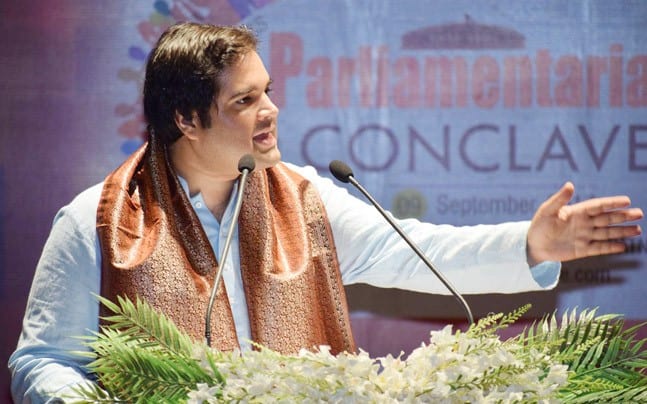In the early days of Parliament, debates were civil, marked by only the towering tones of soaring rhetoric and grim statistics, with not a disruption or bout of aggression shown. Our political debates have seemingly coarsened ever since
By Varun Gandhi
In 1963, Ram Manohar Lohia wrote a pamphlet highlighting the Rs 25,000 per day spent on Prime Minister Jawaharlal Nehru’s security, which was in stark contrast to the daily life of India’s poor, who had to survive on 3 annas a day. Nehru debated the figure in Parliament, citing Planning Commission statistics to state that the daily income was 15 annas a day. Lohia and Nehru had a round of great debates on issues concerning economic inequality, with member after member of Parliament giving up their allotted speaking time to have these two oratory giants debate an issue to its end. And yet, that debate was civil, marked by only the towering tones of soaring rhetoric and grim statistics, with not a disruption or bout of aggression shown. Our political debates have seemingly coarsened ever since.
Consider the great debate over the Hindu Code Bill. The bill, as drafted by a select committee under BR Ambedkar in 1948, was highly controversial, as it sought to codify and replace a variety of personal and local civil laws with a codified law that did away with the legal importance of caste, made divorce feasible and opened up property rights further to widows and women. The motion to begin the discussion on the Hindu Code Bill was debated for over 50 hours. In Parliament, the bill was compared with the Rowlett Act and highlighted as discriminatory by luminaries like Rajendra Prasad, with some members commenting that the “Hindu religion was in danger”. Others like Ambedkar stated that Hindu society had to evolve with the times.
Furthermore, consider other great speeches that have been the hallmark of our Parliament. Ambedkar’s speech in November 1949 on the Grammar of Anarchy highlighted the importance of holding “fast to constitutional methods of achieving our social and economic objectives” and abandoning “the method of civil disobedience, non-cooperation and satyagraha”. Piloo Mody grilled Indira Gandhi on the launch of India’s first satellite, by stating “Madam Prime Minister, we know our scientists have taken great strides in technology, I would be obliged if you could enlighten us as to why our telephones don’t work.”
Despite significant political differences in the early days of our Parliament, there was a feeling of camaraderie, with a shared project of nation-building. And this wasn’t just elitism run amok – our Parliamentarians from the 1st Lok Sabha represented a cornucopia of regions and ethnicities; the hinterland was represented. India was perhaps lucky – post Independence, luminaries like Nehru, Patel and Lohia sought to encourage democratic temper, passionately discussing varying topics without giving into rank populism and invective. As Nehru once stated, parliamentary democracy then demanded many virtues – “a certain devotion to work” and a “large measure of cooperation, self-discipline and restraint”. Prime Minister AB Vajpayee built on this narrative, initiating coalition dharma, crossing political lines and seeking genuine legislative achievement instead of credit.
Parliament was supposed to be union of soaring rhetoric, albeit with a grassroots touch. Parliamentary debates once focused on national and international issues of critical issues — we once even had a session devoted just to the Korean War in August 1950. One would inherently expect politicians in Parliament, at the opportune moment, to give grandiloquent speeches that sway opinion and unlock legislative logjam – and yet such oratory is missing.
Speeches have been denigrated into indistinguishable sound bites and borrowed words – a race to aggression has been launched. One thirsts for the historical moments witnessed in Parliament — once while rejecting an amendment moved by Rajaji, Nehru said: “You see Rajaji, the majority is with me”. Rajaji retorted: “Yes, Jawaharlal, the majority is with you but the logic is with me”.
This poor standard of debate reflects the state of our national discourse. Our debates have become a jousting sport, made perhaps more for the 8pm TV news. The rise of populism has infantilised speeches, encrusting them with cheap rhetorical styles — the brief introduction to a distressing or uplifting personal story, followed by single-issue solutions that solve nothing. Once the great debate of the time was about launching rockets; now it’s about presenting one’s version of ancient history. Political rhetoric was once considered a respected skill. This shaping of democracies has been guided, supported and hastened by public speakers of great persuasive ability, whether a Nehru, Burke or Churchill. The public forum, as Parliament truly is, offers the modern MP a chance to critique, challenge, encourage and advocate real change through a conversation, infused with rhetoric.
This idea of a constructive Parliament, one where legislation is vigorously debated, has been embedded in our national fabric for decades. But to carry this forward, we need to clean the Augean stables.
(The article was first published on Hindustan Times written Varun Gandhi who is BJP national general secretary and a Lok Sabha MP)

